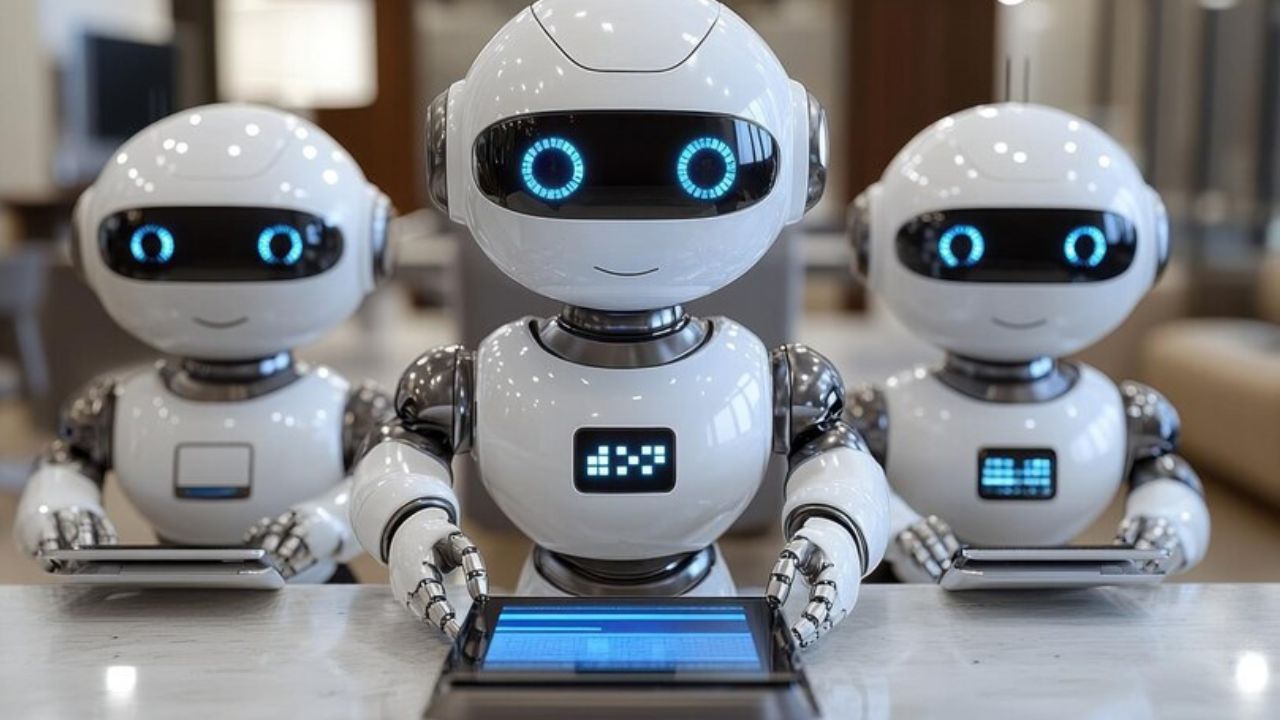Technology
Navigating the AI Job Landscape: Opportunities and Challenges

Navigating the AI Job Landscape is the work market is changing as artificial intelligence (AI) transforms industries at a rate never seen before. Artificial Intelligence is transforming the workforce by generating new jobs and automating repetitive processes. This essay examines the benefits and challenges that the current AI job market offers to businesses and job seekers alike.
The Rise of AI in the Job Market
AI’s Impact on Employment
Navigating the AI Job Landscape has a significant impact on the labor economy. By automating repetitive activities, it frees up human labor for more intricate and creative projects. Numerous industries, including healthcare, banking, manufacturing, and customer service, have seen this change.
Creation of New Job Roles
Despite the misconception that AI would replace jobs, it is really creating new ones. Among the newly popular careers are AI specialists, data scientists, machine learning engineers, and AI ethicists. These positions call for a special combination of domain expertise, technical proficiency, and ethical awareness.
Opportunities in the AI Job Market
High Demand for AI Specialists
The need for experts in AI is growing rapidly. Employers are searching for experts in the development and application of AI technologies. Businesses must continue to be competitive in an increasingly automated world, which is what is driving this demand.
Diverse Career Paths
Navigating the AI Job Landscape provides a variety of professional options. For those with different skill sets, there are lots of chances, from implementation and maintenance to research and development. While AI developers create and develop AI systems, data scientists examine and understand complex data.
Skills Needed for AI Jobs
Technical Skills
In the realm of AI, technical proficiency is essential. It is necessary to be proficient in programming languages like as Python, R, and Java. It is also essential to understand neural networks, machine learning methods, and deep learning frameworks like PyTorch and TensorFlow.
Soft Skills
Although technical abilities are essential, soft skills are just as significant. Working with cross-functional teams and converting technological ideas into business solutions require strong problem-solving, critical thinking, and communication skills.
Education and Training
Formal Education
For AI jobs, a good academic foundation in computer science, mathematics, or engineering is frequently necessary. A Master’s or Ph.D. can give you a competitive advantage, particularly in jobs requiring a lot of research.
Continuous Learning
AI is a field that is fast developing. It is imperative to pursue ongoing education via conferences, workshops, certificates, and online courses in order to stay current with industry developments and remain marketable.
Challenges in the AI Job Market
Skill Gap
The talent gap is one of the major obstacles in the AI job market. There are not enough skilled workers to fulfill the expanding demand. This discrepancy results from the faster pace at which AI technologies are developing than from workers gaining the requisite skills.
Ethical and Bias Concerns
Biases in the training data that AI systems use can be reinforced. It is a challenge to ensure ethical AI research and application; it calls for attention to detail as well as a dedication to justice and openness.
Preparing for an AI Career
Building a Strong Portfolio
Developing a solid portfolio is essential for those who want to work in AI. Engage in practical tasks, make contributions to open-source projects, and use internet resources like GitHub and Kaggle to highlight your abilities.
Networking and Mentorship
Your AI profession can be greatly impacted by mentoring and networking. Become a member of organizations for professionals, go to industry functions, and look for seasoned experts to mentor you. These relationships may lead to new opportunities and offer insightful information.
The Future of AI Jobs
Evolving Job Roles
Employment jobs will change as AI develops. There will be new vocations that call for a blend of domain-specific knowledge and AI proficiency. Prolonging your career will require you to remain flexible and receptive to new ideas.
Collaboration Between Humans and AI
Humans and AI will probably need to operate closely together in the workplace of the future. Artificial intelligence (AI) will enhance human abilities rather than replace them, allowing us to solve more challenging issues and create in previously unthinkable ways.
Conclusion
The job market for AI is expanding and has a lot of promise. Although it comes with obstacles like ethical dilemmas and skill deficits, the opportunities are enormous. Individuals can succeed in this changing sector if they embrace new positions, pursue ongoing education, and acquire the necessary abilities. Remaining flexible and utilizing AI’s potential to promote constructive change in the workplace are essential for success.
FAQs
What are the most in-demand AI job roles?
Among the most sought-after positions are those for AI specialists, data scientists, machine learning engineers, and AI ethicists.
What technical skills are essential for a career in AI?
It is imperative to have expertise in machine learning techniques and frameworks such as TensorFlow and PyTorch, along with programming languages like Python, R, and Java.
How can I keep up with advancements in AI?
It is essential to continue studying through conferences, workshops, certifications, and online courses if you want to keep up with AI developments.
What is the importance of soft skills in AI careers?
Soft skills are essential for working in teams and converting technical ideas into workable commercial solutions. These include problem-solving, critical thinking, and effective communication.
How can I build a strong portfolio for an AI career?
Engage in practical projects, make contributions to open-source projects, and use platforms such as GitHub and Kaggle to demonstrate your abilities.
Technology
The Rise of AI Chatbot Robots:Transforming Communication

The Rise of AI Chatbot Robots or artificial intelligence (AI) systems, are leading the way in this transformation in how humans engage with technology. These digital assistants are becoming essential tools for both individuals and enterprises because of their capacity to handle personal tasks, automate interactions, and offer customer support. However, why are AI chatbots becoming so popular and what precisely makes them so powerful?
What Are AI Chatbot Robots?
Artificial intelligence chatbots are essentially software programs that mimic human speech. Their remarkable versatility stems from their ability to comprehend and react to inquiries using natural language processing (NLP). AI chatbots simplify communication by giving prompt answers, whether you are conversing with an e-commerce bot to track a purchase or your virtual assistant like Siri.
How Do AI Chatbots Work?
NLP and machine learning are used in tandem by AI chatbots to comprehend and produce text that is human-like. This is how it operates:
Natural Language Processing (NLP): This enables the chatbot to comprehend the context of the user’s query and provide relevant assistance.
Machine Learning: Chatbots pick up on interactions over time and get better at responding in every exchange.
Pre-programmed Responses: While some chatbots are more adaptable and provide unique responses, others function with a fixed set of responses.
Benefits of AI Chatbots
The efficiency of AI chatbot robots is what makes them appealing. They are able to manage an infinite number of tasks concurrently, which reduces wait times and offers 24/7 help. This talent is especially useful in fields where timely interactions are essential, such as customer service.Among the principal advantages are:
24/7 Availability: Chatbots are not human-dependent on sleep. They are always willing to help.
Cost-Effectiveness: Businesses can save costs on customer care without sacrificing quality.
Personalization: More sophisticated AI chatbots are able to recall past exchanges and provide customized, human-feeling responses.
Challenges Faced by AI Chatbots
AI chatbots have drawbacks in addition to advantages. One reason is that they can occasionally misinterpret intricate requests or be unable to recognize the subtleties of human emotion, which can result in unpleasant user experiences. Furthermore, too much reliance on chatbots can occasionally prevent real human engagement.
Conclusion
The Rise of AI Chatbot Robots skills will advance along with technology. More advanced chatbots that can handle intricate queries, comprehend context better, and provide even more individualized experiences are something we should anticipate.
FAQs
What industries use AI chatbots?
AI chatbots are extensively utilized in e-commerce, healthcare, education, and customer support.
Can AI chatbots replace human workers?
They are capable of doing repetitive jobs, but they cannot take the role of human empathy and critical thought.
Are AI chatbots secure?
Although the majority of chatbots are built with security features, sensitive data should always be handled with care.
Do AI chatbots understand all languages?
Though they might only speak the main languages spoken worldwide, many AI chatbots are multilingual.
Can I create my own AI chatbot?
Indeed, there are systems out there that let people create and modify their own AI chatbots.
Technology
The Allure of Epic Space Sagas: Journey Beyond the Stars

The Allure of Epic Space Sagas are definitely captivating for some reason. These expansive, star-studded adventure stories take us to far-off galaxies, introduce us to extraterrestrial cultures, and force us to consider the true nature of humanity. Space sagas have a timeless appeal that never goes out of style, whether it is because of the character connections, the discovery of unexplored territories, or the conflicts between good and evil.
The Vastness of Space as a Backdrop
The setting of space sagas is one of their most captivating features. Space is the ideal setting for storytelling because of its boundless potential and myriad secrets. Because of the cosmos’ immense size, one may imagine entire galaxies with their own distinct histories, cultures, and wars. Writers and filmmakers can explore subjects that are deeply personal and universal thanks to this boundless breadth.
The Archetypal Hero’s Journey
Conflict on a Galactic Scale
Large-scale battles spanning entire star systems are a hallmark of epic space sagas. The fate of the galaxy is frequently at stake in these battles, which frequently pit civilizations against one another. These epics tackle the difficulties of battle, diplomacy, and survival on a massive scale, whether it is through the uprising against the Empire in Star Wars or the interplanetary politics of The Expanse. The characters and their worlds may suffer significant repercussions from the resolution of these conflicts, which always carry high stakes.
Complex Characters and Relationships
Space sagas delve into the personal struggles, moral dilemmas, and evolving dynamics between characters; whether it is the intense rivalry between Kirk and Khan in Star Trek or the mentor-student relationship between Obi-Wan Kenobi and Anakin Skywalker, these relationships add depth and emotional weight to the narrative. While the grandeur of these stories lies in their vast settings and epic battles, the emotional core of these stories is often found in their characters and relationships.
Exploration of Philosophical and Ethical Questions
Space sagas explore personal struggles, moral dilemmas, and evolving relationships. Whether it’s the rivalry between Kirk and Khan in Star Trek or the mentor-student bond between Obi-Wan and Anakin in Star Wars, these connections add depth and emotional weight. While the grandeur lies in vast settings and epic battles, the true emotional core is often found in the characters and their relationships.
The Role of Technology and Innovation
Technology frequently has a significant role in space sagas, both as a theme and a tool. The genre is characterized by advanced spacecraft, futuristic weapons, and AI-driven systems. Apart from the impressive devices and technology, these narratives frequently examine the ramifications of technological progress. What happens, as demonstrated in 2001: A Space Odyssey, when AI develops sentience? Or, as in WALL-E, when a civilization gets overly reliant on technology? These stories mirror our own technological progress and the moral conundrums it has brought about.
A Sense of Wonder and Imagination
Space sagas are fundamentally imaginative and wonder-filled stories. They allow us to imagine possibilities both terrible and hopeful, dream of distant civilizations, and ponder what lies beyond Earth. This sense of awe draws audiences into these stories, making them participants in a grand adventure rather than mere observers.
Conclusion
The appeal ofThe Allure of Epic Space Sagas is distinct and persistent. They blend the excitement of exploration with thought-provoking philosophical issues against the backdrop of the vast cosmos. Space sagas captivate everyone, offering grand conflicts, multifaceted personalities, and the thrill of exploring uncharted territory. They serve as a reminder that, despite the vastness and mystery of the cosmos, human experience is universal and occurs everywhere and at any time.
FAQs
What defines an epic space saga?
The hallmark of an epic space saga is its vast scope, which frequently includes interplanetary travel, nuanced character development, and high stakes battles that have the potential to impact entire galaxies.
Why are space sagas so popular?
The combination of adventure, creativity, and philosophical investigation set against the vast and enigmatic backdrop of space makes space sagas appealing to viewers.
What are some classic examples of space sagas?
Star Wars, Star Trek, Dune, and Battlestar Galactica are a few iconic examples.
Do space sagas always involve conflict?
Space sagas frequently center on battle, although they can also emphasize discovery, diplomacy, and the pursuit of knowledge.
Can space sagas be considered a reflection of our society?
Yes, a lot of space sagas reflect our current reality by using their futuristic settings to examine modern problems like technology, ethics, and warfare.
Technology
Fascinating Facts About Astronauts:The Ultimate Guide

Fascinating Facts About Astronauts are among the most intriguing individuals on the planet. Their journeys into space captivate our imagination and push the boundaries of human capability. From rigorous training to the extraordinary experiences of space travel, astronauts lead lives that are nothing short of remarkable. In this article, we’ll explore some fascinating facts about these brave space explorers.
Astronaut Training is Intense
A candidate for space travel must pass a rigorous selection process that includes physical fitness tests, swimming qualifications, survival training, learning how to operate spacecraft, and conducting scientific experiments.
The First Astronaut Was Yuri Gagarin
Spaceflight pioneer Yuri Gagarin of the Soviet Union was the first person to enter space. His orbit of Earth onboard Vostok 1 on April 12, 1961, created history and paved the basis for further space exploration. Although his journey was short—only 108 minutes—it was the first instance of human spaceflight.
Astronauts Experience Weightlessness
The ability to experience microgravity, or weightlessness, is one of the most remarkable features of space travel. Fascinating Facts About Astronauts float freely in space because they are always falling freely toward Earth. They are able to carry out many chores, like as eating and moving around the spaceship, because to their weightlessness.
Space Travel Affects the Body
The effects of living in space on the human body can be profound. Because of the absence of gravity, astronauts frequently suffer from bone loss and muscular atrophy. They also have to deal with issues like fluid changes, which can bloat their faces. Astronauts exercise regularly and eat a particular diet to counteract these effects.
Space Suits Are Highly Advanced
Space suits are sophisticated technological instruments meant to keep astronauts safe, not merely protective clothes. In addition to controlling temperature and offering life support, these suits shield wearers from radiation and micrometeoroids. They also have an integrated communication system and an eye-protector visor to protect the eyes from bright sunlight.
The International Space Station (ISS) Is a Collaborative Effort
One of the greatest triumphs of global cooperation is the International Space Station (ISS). The space agencies of the United States, Russia, Europe, Japan, and Canada are all involved in this collaborative endeavor. The International Space Station (ISS) functions as a platform for global cooperation in space exploration as well as a facility for scientific research.
Astronauts Must Adapt to Extreme Environments
Space is a harsh environment with high radiation levels, varying temperatures, and vacuum conditions. In addition to learning how to carry out repairs, conduct experiments, and pilot the spacecraft in difficult circumstances, astronauts are taught to withstand these extremes.
Astronauts Conduct Scientific Research
Because of the special microgravity environment on Earth, astronauts carry out a wide range of scientific research there. Materials science, physics, astronomy, and biology are among the research fields. These tests support the creation of new technologies and advance our knowledge of basic processes.
Spacewalks Are Complex Operations
Extravehicular activities (EVAs), or spacewalks, are some of the hardest jobs astronauts perform. Astronauts exit the spaceship to conduct experiments or maintenance outside of the station during a spacewalk. Wearing a heavy space suit, they have to navigate in a vacuum, which calls for exact coordination and communication.
Astronauts Have Unique Psychological Challenges
For astronauts, the loneliness and confines of space can be psychologically taxing. They spend a lot of time living in cramped quarters with a small crew, which can be detrimental to mental health. Space agencies offer training and psychological support to astronauts in order to help them deal with these difficulties and preserve team unity.
Astronauts Have a Unique Perspective on Earth
Fascinating Facts About Astronauts have a unique perspective that few others have: they can see the entire Earth from space. This viewpoint frequently arouses a strong sense of kinship with our world and a drive to preserve it. A lot of astronauts say that being in space has increased their awareness of environmental problems and the vulnerability of our planet.
Space Food Is Specially Designed
In microgravity, astronauts eat specially made space cuisine that is simple to prepare and consume. Space food needs to be durable, nourishing, and resilient to the harsh conditions of space flight. It is available in a variety of formats, such as packed meals, freeze-dried food, and dehydrated food.
Astronauts Can Grow Plants in Space
Fascinating Facts About Astronauts that plants have been successfully cultivated in orbit by astronauts is important for upcoming extended trips. Growing plants in space gives astronauts access to fresh food while also assisting researchers in understanding how plants adjust to microgravity. Additionally, it aids in the creation of long-lasting life support systems.
Space Travel Can Affect Sleep Patterns
The spacecraft’s continuous orbit and microgravity can interfere with astronauts’ sleep cycles. Because of the unusual sleeping arrangements in the spacecraft and the lack of a day-night cycle, they might have trouble falling asleep. To combat these consequences and make sure they get enough sleep, astronauts adhere to strict sleep guidelines.
conclusion
Exciting opportunities for space exploration are ahead, including trips to Mars and beyond. New technology and approaches for deep-space exploration are being developed by space organizations and private enterprises. The astronauts of the future might visit far-off planets and discover uncharted territory in our solar system.
FAQs
What does an astronaut do?
In orbit, astronauts carry out experiments, maintain spaceships, and conduct scientific research. They contribute to the advancement of our knowledge of space and space travel and take part in spacewalks.
How do astronauts train for space travel?
The intensive training that astronauts get covers scientific methods, spacecraft operations, survival skills, and physical fitness. They also get practice handling crises and situations involving zero gravity.
What is weightlessness in space?
When astronauts are in a constant condition of free fall around Earth, they experience weightlessness, sometimes known as microgravity. They are therefore able to float freely inside the spacecraft because there is little to no gravitational force acting on them.
How does space travel affect the body?
Because there is no gravity in space, space travel can cause physiological changes such as muscle atrophy, bone loss, and fluid imbalances. To lessen these consequences, astronauts adhere to unique workout and dietary plans.
What is the International Space Station (ISS)?
Large spaceships like the International orbit Station (ISS) are used by astronauts from several nations to carry out scientific research in orbit. It is an important example of a multinational space exploration collaboration.
-

 Celebrity10 months ago
Celebrity10 months agoJulia Rejean Moorhead: A Trailblazer in Her Field
-

 INFORMATION10 months ago
INFORMATION10 months agoUnderstanding Information: Its Role and Impact in Our Lives
-

 News10 months ago
News10 months agoThe Ever-Evolving World of News:Global Events Unfolding Today
-

 Sports10 months ago
Sports10 months agoGonzaga Basketball: The Rise of a College Hoops Powerhouse
-

 Sports10 months ago
Sports10 months agoThe Incredible Benefits of Sports: Boost Your Life on All Fronts
-

 Business10 months ago
Business10 months agoRogue Trader Rotate Grand Strategist:The Dynamic World of Trading
-

 Health10 months ago
Health10 months agoThe Ultimate Guide to Health: Tips and Strategies for a Healthier
-

 Technology8 months ago
Technology8 months agoFascinating Facts About Astronauts:The Ultimate Guide
